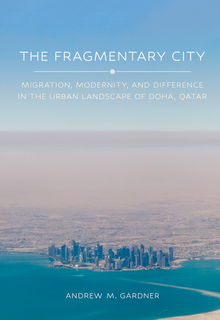The Fragmentary City
Migration, Modernity, and Difference in the Urban Landscape of Doha, Qatar
As Andrew M. Gardner explains in The Fragmentary City, in Qatar and elsewhere on the Arabian Peninsula, nearly nine out of every ten residents are foreign noncitizens.Many of these foreigners reside in the cities that have arisen in Qatar and neighboring states. The book provides an overview of the gulf migration system with its diverse migrant experiences. Gardner focuses on the ways that demography and global mobility have shaped the city of Doha and the urban characteristics of the Arabian Peninsula in general. Building on those migrant experiences, the book turns to the spatial politics of the modern Arabian city, exploring who is placed where in the city and how this social landscape came into historical existence. The author reflects on what we might learn from these cities and the societies that inhabit them.
In The Fragmentary City, Andrew M. Gardner frames the contemporary cities of the Arabian Peninsula not as poor imitations of Western urban modernity, but instead as cities on the frontiers of a global, neoliberal, and increasingly urban future.
Andrew M. Gardner is Professor of Anthropology at the University of Puget Sound in Tacoma, Washington. He has focused his research on the places, peoples and societies that interact on the Arabian Peninsula, where he has conducted extensive fieldwork.
Table of Contents
The Fragmentary City
Uncategorized

The Fragmentary City
Andrew M. Gardner- This text has 0 annotations
- This text has 186 highlights
Metadata
- publisherCornell University Press
- publisher placeIthaca, NY

